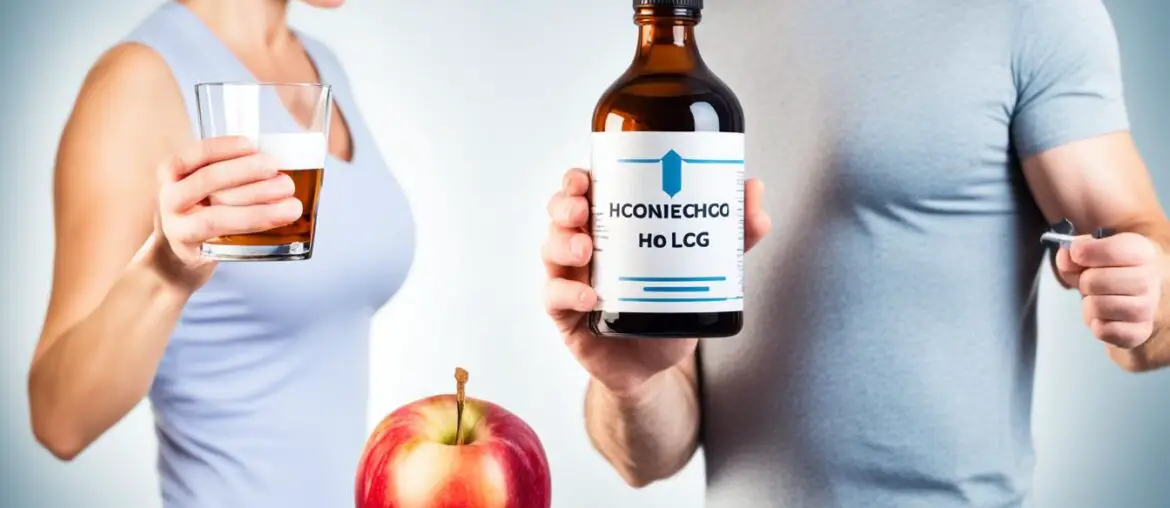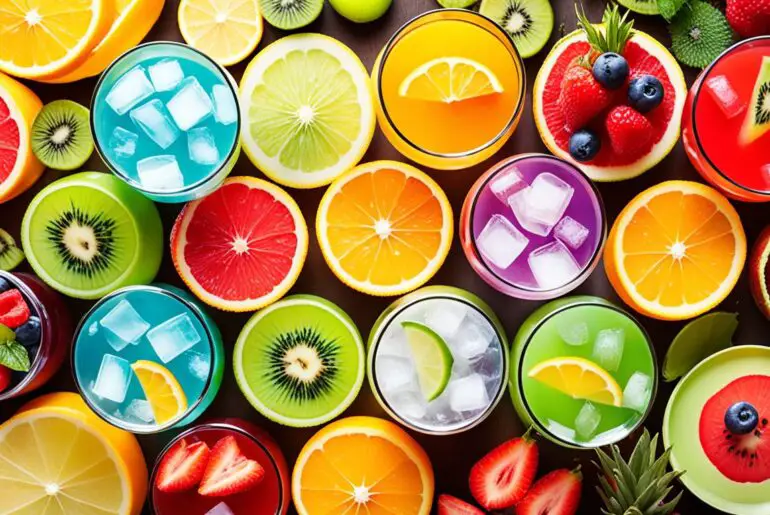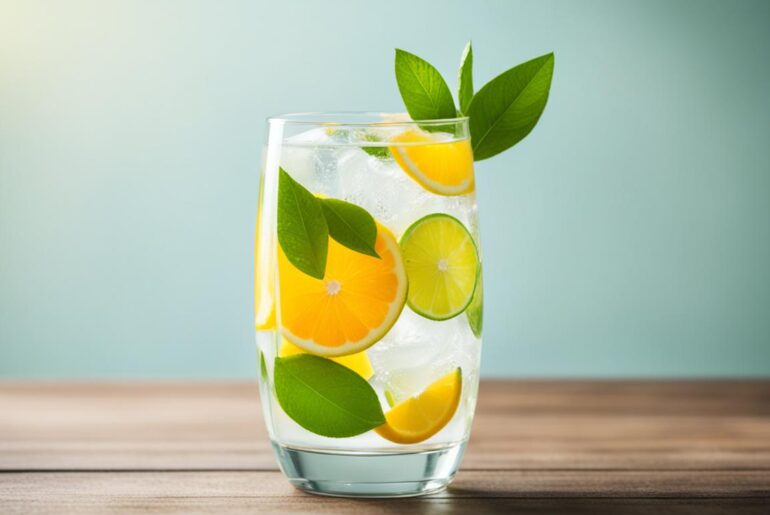When it comes to achieving successful weight loss with the HCG Diet, there are numerous factors to consider. But what about alcohol? Can you still enjoy a glass of wine or a cocktail while following the HCG protocol? The answer may surprise you.
Many individuals wonder about the effects of alcohol on HCG weight loss. Does alcohol consumption hinder progress or can it coexist with the HCG diet? It’s time to separate fact from fiction and uncover the truth behind alcohol and HCG weight loss.
Key Takeaways:
- Alcoholic drinks are generally not recommended on the HCG Diet as they tend to be high in calories, sugar, and carbs, hindering weight loss progress.
- Alcohol affects the appetite centers of the brain, leading to increased hunger and potentially poor dietary choices.
- Dr. Simeons, the founder of the HCG Diet, advises against alcohol consumption during the low-calorie phase, as it can impair the HCG hormone’s effect on metabolism.
- Avoiding alcohol on the HCG Diet can result in more significant and consistent weight loss outcomes.
- After completing the HCG Diet and reaching the maintenance phase, moderate alcohol consumption may be reintroduced, but it is crucial to exercise moderation and be mindful of its impact on weight maintenance.
The Impact of Alcohol on HCG Phase 2
Phase 2 of the HCG Diet is a critical stage for achieving weight loss success. However, consuming alcohol during this phase can have a detrimental effect on your progress. Let’s explore the reasons why alcohol and the HCG Diet do not mix well.
Firstly, alcohol is known to be high in calories. In fact, a single drink can easily exceed the daily calorie limit recommended during Phase 2 of the HCG Diet. This excessive calorie intake can sabotage your weight loss efforts and hinder the effectiveness of the diet.
Furthermore, alcohol is often accompanied by food choices that are not compatible with the HCG Diet’s guidelines. Think about those carb-heavy snacks that we tend to reach for when we have a drink in hand. These indulgences are not only high in calories but also counteract the high-protein plan of the HCG Diet.
Interestingly, alcohol can also lower inhibitions and impair judgment, leading to poor dietary choices. It’s not uncommon to find ourselves making unhealthy food decisions under the influence of alcohol. These choices can derail your progress and make it harder to stick to the HCG Diet regimen.
To summarize, consuming alcohol during HCG Phase 2 can disrupt your weight loss journey and make it challenging to achieve your desired results. It’s best to prioritize your health and stay committed to the HCG Diet plan by avoiding alcohol altogether during this phase.
Alcohol’s Role in HCG Diet-Killer

Alcohol plays a detrimental role in the HCG diet, earning the label of a diet-killer for several reasons. When it comes to weight loss, one of the primary concerns is alcohol’s impact on metabolism. Alcohol and HCG weight loss protocol don’t mix well, as the HCG diet focuses on utilizing protein, fat, and carbs for energy, while alcohol takes precedence in the body’s energy utilization process. As a result, excess calories from alcohol are stored as fat, hinderimg weight loss progress and undermining the effectiveness of the HCG protocol.
Furthermore, alcoholic beverages contain empty calories, contributing to weight gain. Mixers used in cocktails can further exacerbate the caloric intake. This combination of empty calories and high-calorie mixers can lead to poor dietary choices that hinder weight loss efforts. To maximize the effectiveness of the HCG diet and its weight loss injections, it is crucial to strictly adhere to the alcohol restrictions during the low-calorie phase.
| Effects of Alcohol on HCG Weight Loss Protocol | Alcohol and HCG Injections | HCG Diet and Alcohol Restrictions |
|---|---|---|
| Slows down weight loss progress due to its impact on metabolism | Impairs the effectiveness of the HCG injections | Strict alcohol restrictions during the low-calorie phase of the HCG diet |
| Contributes to weight gain through empty calories | Increases the risk of weight gain while on HCG injections | Avoidance of alcoholic beverages during the HCG diet |
| Increases caloric intake when mixed with high-calorie mixers | Can undermine the benefits of HCG injections for weight loss | Limiting alcohol intake to maximize weight loss on the HCG diet |
By understanding the negative effects of alcohol on the HCG diet, individuals can make informed decisions and prioritize their weight loss goals. Avoiding alcohol during the low-calorie phase is crucial for optimal results and maximizing the potential of the HCG weight loss protocol.
Strategies for Quitting Alcohol During HCG
Quitting alcohol during the HCG Diet can be challenging, but there are strategies to make it easier. Staying hydrated by drinking plenty of water can help reduce cravings for alcohol. Engaging in alternative activities such as exercise or hobbies can distract from the desire to have a drink. Avoiding tempting situations, such as bars and restaurants, can also support alcohol abstinence. It is essential to remind yourself of the weight loss goals and the potential benefits of sticking to the HCG Diet.
Once the diet is completed and the maintenance phase is reached, moderate alcohol consumption may be incorporated back into the lifestyle.
When reintroducing alcohol during the maintenance phase, it is important to exercise moderation and choose low-calorie options. Enjoying a glass of red wine with a meal or having a light mixed drink can be a way to incorporate alcohol while still being mindful of caloric intake. However, it is crucial to be aware of the potential impact of alcohol on weight maintenance and make informed choices.
By following these strategies and being mindful of the potential effects of alcohol on the HCG Diet, it is possible to navigate the challenges of quitting alcohol and continue on the path to successful weight loss.
Alcohol and Caloric Intake on HCG
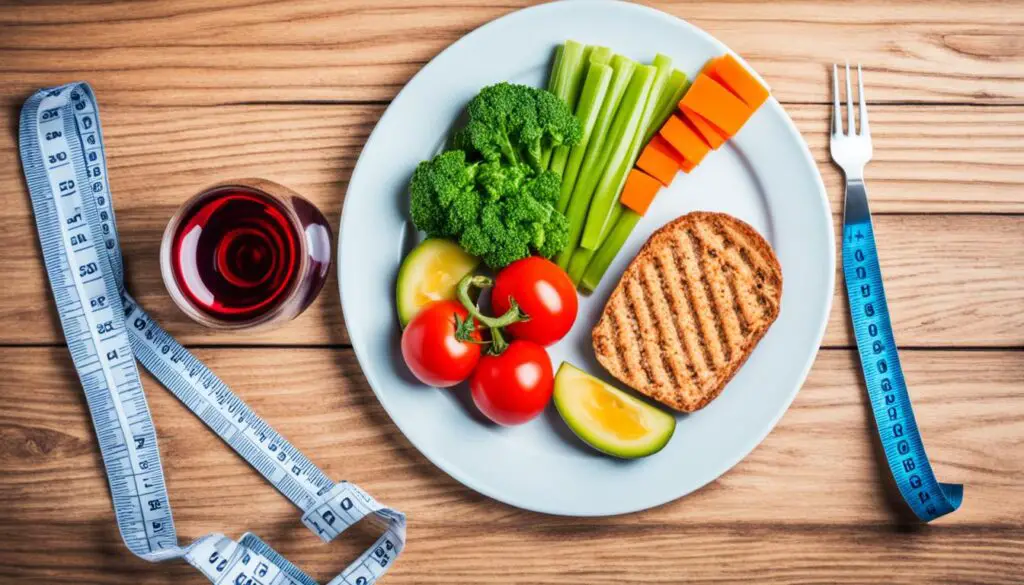
When following the HCG Diet, it is important to be mindful of the impact of alcohol consumption on caloric intake. Alcoholic beverages, such as mixed drinks and beer, are often high in calories.
Exceeding the daily calorie limit set during the low-calorie phase can inhibit weight loss progress and make it challenging to achieve the desired results. It is crucial to consider the caloric content of alcoholic drinks carefully when following the HCG Diet protocol.
“Alcohol can significantly contribute to caloric intake, hindering weight loss progress on the HCG Diet.”
While some individuals may navigate weight loss despite consuming alcohol, avoiding alcohol altogether would likely yield more significant and consistent results.
By proactively monitoring alcohol’s impact on caloric intake, individuals can maximize the effectiveness of the HCG Diet and optimize weight loss outcomes.
| Alcoholic Beverage | Caloric Content |
|---|---|
| Mixed Drinks | Varies depending on ingredients and serving size |
| Beer | Average of 150-200 calories per serving |
It is clear from the table above that alcoholic beverages can significantly contribute to caloric intake. To stay on track with the HCG Diet, it is recommended to prioritize non-alcoholic options or choose lower-calorie alternatives when consuming alcohol.
By being mindful of caloric intake and making informed choices, individuals can ensure that alcohol does not impede their weight loss progress while following the HCG Diet.
Managing Alcohol Cravings on HCG
Cravings for alcohol can arise during the HCG weight loss protocol, but there are effective strategies to manage them. It’s important to prioritize your weight loss goals and recognize the potential impact of alcohol on your progress.
One key tactic is to drink plenty of water throughout the day. Staying hydrated not only helps keep your body functioning optimally but can also help curb cravings for alcohol. Water can act as a natural appetite suppressant and reduce the desire for alcoholic beverages.
Engaging in alternative activities and hobbies can serve as a distraction from alcohol cravings. Find something you enjoy, such as exercising, reading, or pursuing a creative outlet, to occupy your mind and keep your focus away from alcohol.
If you find yourself in tempting situations where alcohol is present, consider removing yourself from those environments. Avoiding social events or gatherings where alcohol is the center of attention can help you resist the urge to indulge.
Lastly, reminding yourself of the weight loss goals you’ve set and the progress you’ve made can be incredibly powerful in overcoming alcohol cravings. Visualize the positive changes you want to achieve and the benefits of sticking to the HCG injections. Reinforcing your motivation can provide the mental strength needed to resist the temptation of alcohol.
By implementing these strategies, you can effectively manage alcohol cravings and stay on track with your HCG weight loss journey.
Relevant Resource:
“Drinking water can help curb alcohol cravings, keep your body hydrated, and support weight loss progress.” – HCGDiet.com
Alcohol Options on HCG
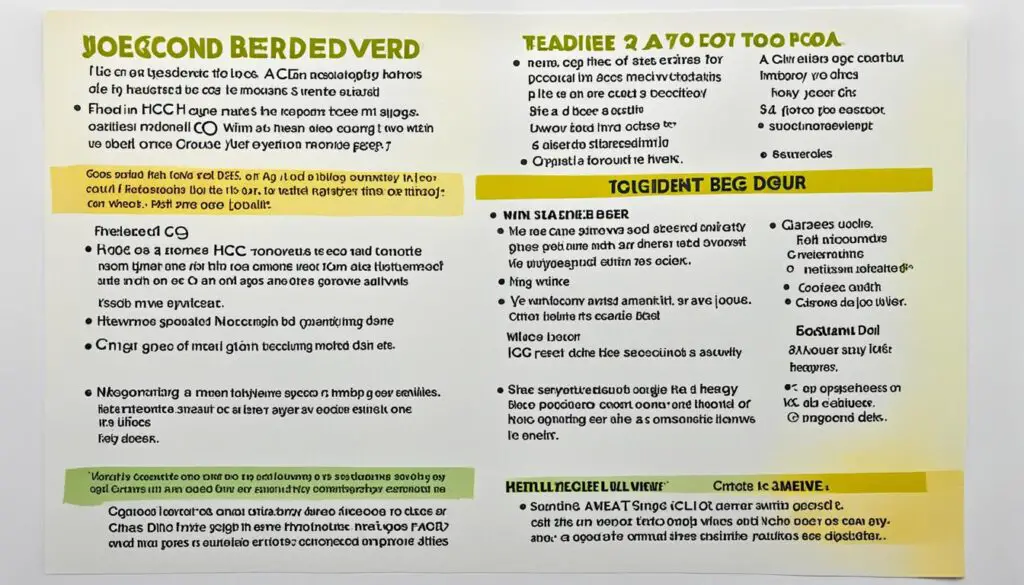
Although alcohol is generally discouraged on the HCG Diet, there are some limited options for those who still wish to consume alcohol. While it is important to note that even if a drink or two is consumed, excessive alcohol intake should be avoided as it can hinder weight loss progress on the HCG Diet.
Orange juice and vodka or vodka mixed with soda water and a squeeze of lemon can be lower-calorie choices for individuals looking to enjoy a drink on the HCG Diet. Another option is to have a low-calorie white wine mixed with soda water. These options provide alternatives to higher-calorie alcoholic beverages typically consumed.
By opting for these lighter choices, individuals can potentially minimize the detrimental effects of alcohol on their weight loss efforts while still indulging in a drink or two. It is important to exercise moderation and be mindful of the potential impact of alcohol on the HCG Diet’s restrictions.
| Alcohol Options on HCG | Calories per Serving |
|---|---|
| Orange juice and vodka | Approximately 150-200 calories |
| Vodka mixed with soda water and a squeeze of lemon | Approximately 100-120 calories |
| Low-calorie white wine mixed with soda water | Varies based on specific wine and serving size |
Incorporating Alcohol After HCG
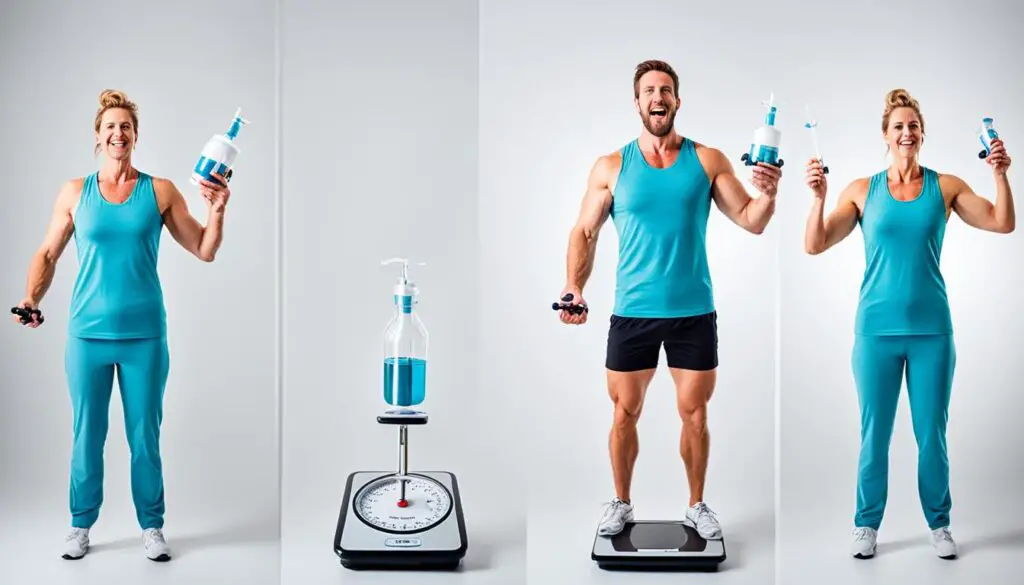
After successfully completing the HCG Diet and reaching the maintenance phase, it is natural to wonder about incorporating alcohol back into your lifestyle. While it is possible to enjoy small amounts of alcohol after HCG, it is essential to exercise moderation and be mindful of the potential impact on weight maintenance.
One way to reintroduce alcohol in a controlled manner is by enjoying a single glass of red wine with a meal. Red wine is often associated with various health benefits, such as antioxidants and heart health, making it a preferred choice. By pairing it with a meal, you can enjoy the flavors and benefits of wine while still being mindful of caloric intake.
Although moderate alcohol consumption may be an option during the maintenance phase, it is essential to proceed with caution. As a general rule, it is advisable to limit alcohol consumption to maintain a healthy weight in the long term. Monitoring your alcohol intake and making smart choices will help you achieve your weight loss goals and sustain them over time.
Remember, everyone’s body reacts differently to alcohol, so it’s important to listen to your body and adjust accordingly. Balance is key, and finding the right approach to incorporating alcohol after HCG will help you maintain a healthy and sustainable lifestyle.
| Alcohol Options | Moderate Intake | Considerations |
|---|---|---|
| Red Wine | 1 glass | Pair with a meal to enjoy flavors and potential health benefits. |
| White Wine | 1 glass | Opt for low-calorie white wine and enjoy in moderation. |
| Vodka | 1 shot | Choose mixers with no added sugars and avoid high-calorie options. |
| Gin | 1 shot | Pair with a low-calorie mixer for a refreshing drink option. |
| Tequila | 1 shot | Enjoy straight or with a splash of lemon or lime juice. |
Long-Term Effects of Alcohol on Weight Loss
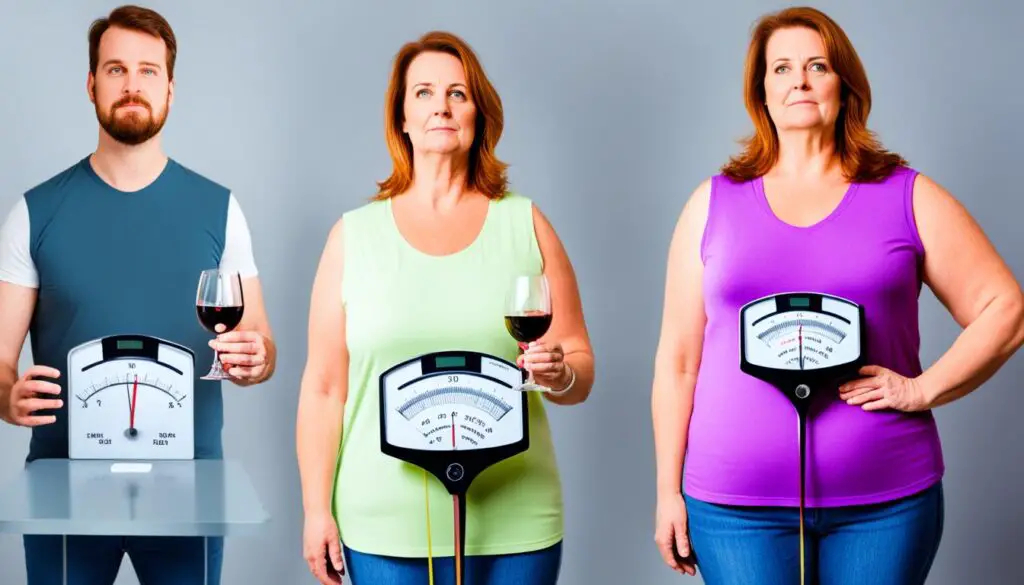
When it comes to achieving and maintaining weight loss goals, it is important to consider the long-term effects of alcohol consumption. While it can be tempting to indulge in a drink or two, excessive alcohol intake can have a negative impact on weight loss and overall progress.
Alcohol contains calories that contribute to weight gain. Consuming excessive amounts of alcohol can lead to an increase in overall caloric intake, which can hinder weight loss efforts. Additionally, alcohol impairs judgment and decision-making, often leading to poor dietary choices that further sabotage weight loss progress.
It’s important to understand that the HCG weight loss protocol emphasizes a balanced and healthy approach to eating. Alcohol consumption, especially in excess, can disrupt this balance and make it difficult to achieve long-term weight loss success.
When considering the impact of alcohol on weight loss, it is essential to prioritize overall health and wellness. Limiting alcohol consumption can not only improve weight management but also have positive effects on other aspects of health, such as liver function and cardiovascular health.
The Importance of Moderation
Moderation is key when it comes to incorporating alcohol into a healthy lifestyle. After completing the HCG Diet and reaching the maintenance phase, it may be possible to reintroduce moderate alcohol consumption. However, it is crucial to exercise caution and be mindful of the potential effects on weight maintenance.
For those who choose to drink alcohol, it is advisable to opt for lower-calorie options and practice portion control. Enjoying a single glass of red wine with a meal or opting for light beers can help minimize the impact on overall caloric intake.
Remember, the key is moderation. Excessive alcohol consumption can not only lead to weight gain but also have detrimental effects on overall health. By making informed choices and prioritizing moderation, individuals can strike a balance between their weight loss goals and enjoying the occasional alcoholic beverage.
| Long-Term Effects of Alcohol on Weight Loss | Key Takeaways |
|---|---|
| Alcohol contains calories that contribute to weight gain | Excessive alcohol intake can hinder weight loss efforts |
| Alcohol impairs judgment and decision-making, leading to poor dietary choices | Moderation is crucial when incorporating alcohol into a healthy lifestyle |
| Limiting alcohol consumption improves weight management and overall health | Opt for lower-calorie options and practice portion control |
Conclusion
The consumption of alcohol during the HCG Diet is generally discouraged due to its potential negative effects on weight loss and overall progress. Alcohol is high in calories and can derail dietary efforts by increasing cravings and leading to poor food choices. While individuals may report weight loss despite consuming alcohol, it is believed that avoiding alcohol would result in more significant and consistent weight loss.
After completing the HCG Diet and reaching the maintenance phase, moderate alcohol consumption may be reintroduced, but it is important to exercise moderation and be mindful of its potential impact on weight maintenance. Prioritizing abstinence from alcohol during the HCG Diet can enhance the likelihood of achieving successful weight loss outcomes.
By maintaining a focus on the HCG diet protocol and avoiding alcohol, individuals can maximize their weight loss potential and improve overall health. It is essential to establish a healthy relationship with alcohol, understanding its impact on weight and wellness.
FAQ
Can I consume alcohol while on the HCG Diet?
It is not recommended to consume alcohol while on the HCG Diet. Alcohol tends to be high in calories, sugar, and carbs, which can hinder weight loss progress. Additionally, alcohol affects the appetite centers of the brain, leading to increased hunger. It is best to avoid alcohol during the low-calorie phase of the diet.
…
Continue with the structure, adding the remaining questions and answers to complete the FAQ section.

